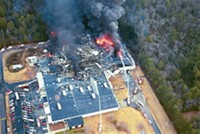Advertisement
Grab your lab coat. Let's get started
Welcome!
Welcome!
Create an account below to get 6 C&EN articles per month, receive newsletters and more - all free.
It seems this is your first time logging in online. Please enter the following information to continue.
As an ACS member you automatically get access to this site. All we need is few more details to create your reading experience.
Not you? Sign in with a different account.
Not you? Sign in with a different account.
ERROR 1
ERROR 1
ERROR 2
ERROR 2
ERROR 2
ERROR 2
ERROR 2
Password and Confirm password must match.
If you have an ACS member number, please enter it here so we can link this account to your membership. (optional)
ERROR 2
ACS values your privacy. By submitting your information, you are gaining access to C&EN and subscribing to our weekly newsletter. We use the information you provide to make your reading experience better, and we will never sell your data to third party members.
Safety
Criticism Of Chemical Safety Board Continues
No letup likely in acrimonious disputes with troubled board
by Jeff Johnson
September 29, 2014
| A version of this story appeared in
Volume 92, Issue 39

Long-standing disputes between the Chemical Safety & Hazard Investigation Board (CSB) and the Environmental Protection Agency’s top independent internal investigator, whose office oversees the board, spilled into public view earlier this month. At a hearing, the House of Representatives Oversight & Government Reform Committee dug into charges leveled by the inspector general that CSB refused to turn over documents to him. This, said EPA Inspector General Arthur A. Elkins Jr., stunted his office’s probe into CSB workers’ claims that the board had violated employees’ rights.
However, a nonprofit watchdog group that represents federal employees criticized Elkins’s office and the Republican-led committee for fighting over what it called trivial matters while avoiding a much-needed discussion of industrial safety.
The House committee’s Sept. 10 hearing followed one in June at which the panel also heard complaints from the EPA Office of Inspector General (OIG). At the June hearing, the committee blasted CSB for delayed accident investigations and mismanagement and released an 84-page report attacking CSB. In response, the board announced management reforms and urged Congress to provide adequate funding so the small, independent agency can meet its charge to investigate the hundreds of chemical-related accidents that occur annually. For committee members, particularly Chairman Darrell Issa (R-Calif.), who led the investigation, CSB’s offer was too little, too late.
The dispute between CSB and Elkins’s office also has attracted attention in the Senate. For months, Sen. Tom Coburn (R-Okla.) blocked confirmation of two presidential nominees to fill key CSB vacancies until the board provided documents to OIG.Last week, Coburn dropped his objections, saying CSB had “substantially complied” with the document request. This confirmation holdup is significant. The board has five slots but now has only two members in place. Four years have passed since the board was fully staffed.
While OIG’s complaints have swayed Congress and led to the House committee’s investigation, the allegations are “a tempest in a teapot,” says Jeff Ruch, the executive director of the nonprofit Public Employees for Environmental Responsibility. This national nonprofit organization consists of federal and state employees, many of whom are whistle-blowers.
Issa’s investigation, Ruch says, is deflecting attention from the key issue of improving industrial safety. Instead, the focus is on “trivial nonissues,” including OIG’s complaints.
CSB and OIG have a long history of disputes. They have been commonplace since OIG received broad oversight authority over CSB through an amendment to a 2001 federal funding law. The disagreements were aired openly in 2007, when then-CSB chair Carolyn Merritt unsuccessfully urged a Senate committee to limit or end OIG’s oversight of CSB. The investigations were “burdensome and unproductive,” said Merritt, who led CSB during its most productive period.
Sparking the House committee’s investigation, Issa said in June, were allegations that CSB managers violated the worker rights of four unnamed CSB employees. The probe broadened through a number of twists.
It began in 2011 and 2012, when the employees took their complaints to the Office of Special Counsel, a federal agency charged with protecting federal workers from prohibited personnel practices. Under federal law, the Office of Special Counsel must protect complainants’ identities.
EPA’s inspector general entered the dispute after learning that CSB may have discovered the identity of the employees who filed the complaint. OIG quizzed board managers, asking for documents pertaining to the leak. CSB refused to comply, saying the documents were legally protected.
Next, in a highly unusual request, the EPA inspector general urged a CSB official to secretly record Special Counsel officials discussing the case, according to Ruch and several federal officials interviewed by C&EN. OIG refused to comment on this allegation.
The inspector general’s investigation then grew to encompass CSB’s overall management.
The review of CSB interactions with its staff will go on for at least 90 more days, Inspector General Elkins said at the September hearing. The board, he acknowledged, had “substantially, but not fully,” complied with OIG’s document demands.
Federal law allows EPA OIG to access all documents CSB possesses, Elkins stated. He added that he will seek private e-mails that may have concerned CSB’s official actions.
This, Ruch says, is an “abusive fishing expedition” by OIG.
“In most cases, [inspector general] access to requested materials should be beyond questions,” Ruch says, but the broad powers granted to these officials “are subject to abuse.” “Congressional oversight committees should ask tough questions about precisely how taxpayers benefit from OIG investigations.”





Join the conversation
Contact the reporter
Submit a Letter to the Editor for publication
Engage with us on Twitter